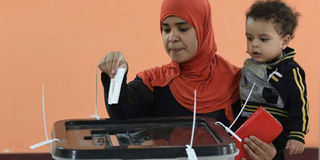Leadership changes loom in several African countries

An Egyptian woman casts her ballot at a polling station in Saad Zaghloul Basha school in Giza, on the third day of voting in the 2018 presidential elections on March 28, 2018. PHOTO | FETHI BELAID | AFP
What you need to know:
- Botswana is respected as one of the Africa’s most stable countries and the continent’s longest continuous multi-party democracy.
- On Tuesday, the ruling Ethiopian Peoples’ Revolutionary Democratic Front elected Abiy Ahmed, 41, its new chairman.
As expected, Egyptian strongman Abdel Fattah al-Sisi romped home with a landslide in the presidential election.
Long before the poll, the incumbent’s critics had described it as a sham, and it was little surprise that the turnover was just 40 per cent of the registered voters.
That was a sharp drop from 47 per cent turnout registered during the last presidential poll in 2014 that catapulted al-Sisi into his first term.
The predictable electoral turn of events in Egypt came when several African countries are expecting changes of leadership, among them Botswana, Sierra Leone and Ethiopia.
IAN KHAMA
In Botswana, the beginning of April is expected to usher in a change of guard in the country’s leadership following the anticipated retirement at the end of March of two-term president Ian Khama.
Khama, 65, ascended to the leadership of his country in 2008, succeeding Festus Mogae, today recognised as one of Africa’s most respected statesmen.
President Khama, who had served as his country’s vice-president since 1998, was formally elected for a five-year presidential term in 2009 and re-elected in 2014 for a second one.
DEMOCRACY
The retiring head of state was the fourth president of Botswana since the country gained independence from Britain in 1966, and his succession will follow a typically Botswanan practice.
He will be succeeded by his vice-president Mokgweetsi Masisi, who will serve as interim president until the next elections in 2019.
The incoming president has already replaced President Khama as the leader of the ruling Botswana Democratic Party, having been elected to the position in July.
Botswana is respected as one of the Africa’s most stable countries and the continent’s longest continuous multi-party democracy.
Having enjoyed smooth transitions and stability since independence, the southern African country is also lauded for being relatively free of corruption and having a good human rights record.
ETHIOPIA
According to observers, the ruling party — which has been in power since 1966 — is expected to face a stiff challenge during next year’s elections from a coalition of four opposition parties.
The looming changes in Ethiopia will, hopefully, occur soon after the formal inauguration of a prime minister to replace Hailemariam Desalegn, who resigned in February.
About midnight on Tuesday, the ruling Ethiopian Peoples’ Revolutionary Democratic Front elected Abiy Ahmed, 41, its new chairman.
The election of Abiy, a member of the Oromo People’s Democratic Organisation, sets him on the path to succeed Hailemariam as prime minister.
OROMO
The new party leader is a former lieutenant colonel in the army and once served as the country’s minister of science and technology.
Should he be confirmed as prime minister as expected, Abiy will become the first ethnic Oromo to lead the country, and will face the challenge of bringing stability to a badly divided nation.
Sierra Leone, which held the second round of the presidential election on Saturday, is also expected to have a new leader come next week, when the results are announced.
The much-anticipated presidential run-off was to be held on Tuesday, but the Supreme Court rescheduled it to Saturday, following a request by the National Electoral Commission.
RUN-OFF
The electoral agency cited insufficient time to conduct the poll following a delay caused by a court order restraining it from preparing for the election.
Saturday's run-off was between the two candidates who emerged top during the first round of the poll on March 7, which did not produce an outright winner.
The run-off became necessary because none of the candidates participating in the first round met the constitutional threshold of 55 per cent of the votes cast.
The two candidates were the ruling All People’s Congress party’s Samura Kamara and Brig Julius Maada Bio of Sierra Leone People’s Party.
The inauguration of a new president will be a welcome culmination of a convoluted electoral process that has been replete with controversy.
In Egypt, the outcome of the poll was widely viewed as predetermined, with the incumbent having only one rival totally lacking credibility.
The opponent was one Moussa Mostafa Moussa, a supporter of the president, and his participation in the election was suspect.





